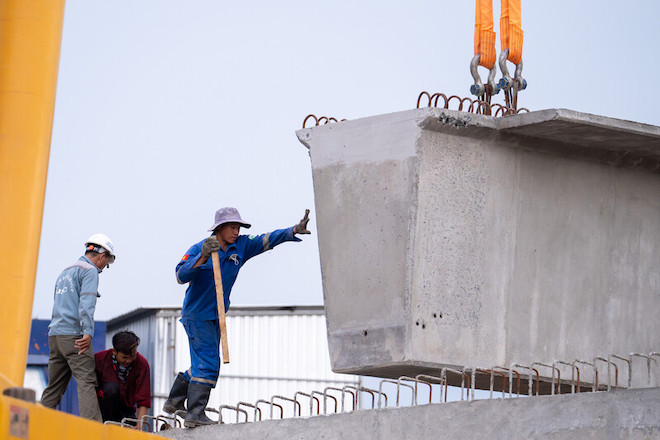
This article is published in collaboration with Infrastructure Asia.
The Asian Development Bank (ADB) estimates Asia would need to invest $26 trillion from 2016 to 2030, or $1.7 trillion per year in infrastructure to maintain its growth momentum, eradicate poverty, and respond to climate change. Of the amount, $9.5 trillion, or $633 billion per year pertains to the needs of South and Southeast Asia. The public sector currently dominates infrastructure financing, accounting for between 62% and 92% of the investments.
To close the infrastructure financing gap and attract institutional capital, multilateral development banks (MDBs) and development finance institutions (DFIs) could expand the use of risk mitigation tools and blended finance and credit enhancement products. "MDBs (and bilateral development partners) have a unique ability to manage risks in developing countries through their multilateral ownership and ability to influence governments. They are hence well placed to provide credit enhancement (e.g. taking the first loss piece in a synthetic securitization structure) with institutional investors coming in to take a standardized senior debt exposure which can be priced lower to reflect the lower risk,” the G20 Eminent Persons’ Group recommended.
A case for using guarantees in blended finance
There is a significant opportunity for guarantees to be used as an enabling instrument to channel debt funding across South and Southeast Asia. Catalytic finance, such as guarantees, can unlock lending from several institutional investors that include local pension funds, insurance companies, provident funds, and asset managers. This is especially beneficial as capacity within commercial banks to provide long-term funding to the market is limited. Institutional funding could come in handy, especially for environmental, social, and governance-oriented projects, such as renewable energy, e-mobility, digital infrastructure, and financial inclusion—all of which, require significant debt capital.
An example of an organization that provides guarantees is GuarantCo. GuarantCo mobilizes private sector local currency investment for infrastructure projects and supports the development of financial markets in lower income countries across Africa and Asia. GuarantCo is part of the Private Infrastructure Development Group (PIDG) and is funded by the governments of the United Kingdom, Switzerland, Australia, and Sweden, through the PIDG Trust, the Netherlands, through FMO and the PIDG Trust, France and Canada. GuarantCo is rated AA- by Fitch and A1 by Moody’s.
One of the most transformational impacts of guarantors like GuarantCo, and arguably the one that sets guarantors apart from traditional DFI debt funding, is the demonstration effect that they can have on a country’s infrastructure financing ecosystem.
Guarantee transactions enable local beneficiary finance institutions to experience new sectors and structures with the support of an experienced guarantor. The demonstration effect extends beyond credit enhancing the transaction through a guarantee, but also takes the form of guidance through the due diligence, documentation, and portfolio management stages of the project. As these local finance parties, whether they be institutional bond investors or banks, gain infrastructure finance experience and become better equipped to assess and manage project risk on their own, the need for guarantors can fall away.
An example of this is Nam Long Investment Cooperation. In 2018, Nam Long, a residential real estate developer in Viet Nam with a focus on affordable housing, targeted to deliver an average of 5,000 units per year over the next 10 years. GuarantCo extended a 100% guarantee for Nam Long’s 7-year fixed rate corporate bond of $30 million to build the core infrastructure for the first phase of the largest affordable housing project ever undertaken by the property firm. This was GuarantCo’s first transaction in Viet Nam and the first guaranteed bond for Nam Long. GuarantCo’s guarantee helped Nam Long raise funds from long-term international institutional investors like Manulife, AIA, and Generali. Thanks to GuarantCo’s support, Nam Long has built a track record and is now raising funds without guarantees.
Advantages of guarantees
There are several key advantages in using guarantees, including the ability to unlock local currency funding, and longer tenors.
Local currency funding. One of the major benefits of guarantees is the ability to unlock local currency funding. By providing guarantees to beneficiaries that include local banks, insurance companies, pension funds, and other institutional investors, project sponsors, and project companies can attain some or all their debt finance in the local currency. This may be particularly beneficial for environmental, social and governance-oriented projects such as renewable energy infrastructure. A significant source of risk is removed because the guarantees are in the local currency. With weakening local currencies and rising interest rates, raising debt at extremely competitive pricing in hard currency has become economically and, in some circumstances, politically unviable. Local currency guarantees can also provide other benefits compared with hard currency financing, for both borrowers and local governments.
In 2019, GuarantCo provided a guarantee to support a 15-year $13.5-million dual currency financing solution on behalf of Technaf Solartech Energy Limited, the first utility-scale solar project in Bangladesh. Technaf is a project that benefits from a local currency tranche. Although the project’s power purchase agreement is linked to the US dollar–Bangladeshi taka exchange rate, the indexation mechanism can take time to be realized, potentially causing cash flow issues in the case of currency fluctuations. By having some of its debt service obligations denominated in takas, the project is better protected against cash flow variances as both revenues and local currency debt tranches are denominated in takas.
Sustainable, long-tenor funding for borrowers and de-risking financiers. Guarantees can also mitigate certain credit or liquidity issues that might otherwise inhibit financers. One of the most pervasive issues facing projects in emerging markets is that local currency funding providers, whether banks or bond investors, are unable to provide debt solutions of sufficient tenor. This can result in projects seeking hard currency debt, or in certain cases being abandoned if suitable financing cannot be attained. Guarantee products can help overcome tenor issues for infrastructure projects. On occasion, it may be enough that a simple partial credit guarantee lowers the risk of a project sufficiently, enabling banks or bond investors to fund the project for a longer tenor than otherwise attainable. Three case studies to bring to note:
- In May 2022, GuarantCo signed a framework guarantee agreement with Mumbai-based Axis Bank to provide up to $200 million of guarantee in Indian rupees for the bank to lend up to $400 million for the e-mobility sector which would enable the borrower to raise debt funding with longer tenor for a sector where long-term debt financing is difficult to come by.
- In December 2022, GuarantCo and Cargill Financial Services International provided a $7-million debt financing solution to First Finance, a Cambodian microfinance institution, supporting the first internationally verified social loan offering affordable housing finance to low- and middle-income households in Cambodia. The transaction will enable First Finance to access their first-ever longer-term financing with a 7-year tenor, on a scale and at a lower cost of funding than would otherwise have been the case without GuarantCo’s involvement.
- In December 2022, GuarantCo provided a guarantee to large corporate investors and two large institutional investors to help Royal Railway Cambodia raise up to $24 million in financing for 10 years. This is the longest tenor corporate bond in Cambodia, listed on the local stock exchange with a floating rate of interest.
Opportunities in South and Southeast Asia
To further accelerate the role of guarantees, a partnership approach is needed. Regional governments must work with DFIs and guarantors like GuarantCo. Several enabling factors are first required before guarantees can have a demonstration effect. These include clear policy and regulations and well-structured infrastructure projects.
Infrastructure Asia (InfraAsia) has developed several capacity-building initiatives such as the Growing Infrastructure Course, where regional government officials participate in thematic courses to learn more about how to enable sustainable and resilient infrastructure development for the region’s long-term economic growth that is conducive for private sector investment.
InfraAsia also works with regional governments to structure their infrastructure projects which can then be ready for further consideration by DFIs. For example, InfraAsia has worked with the Ho Chi Minh City People’s Committee on their wastewater treatment plants, and the Cambodian government, through the Phnom Penh Capital Administration (PPCA), on their waste management initiatives.
Wastewater treatment plants in Viet Nam. To meet the growing needs of 10 million people, Ho Chi Minh City drew up a masterplan to build 12 wastewater treatment plants in the city to treat up to 90% of the wastewater and sewage water discharged by the city. InfraAsia worked with the local authorities to support the prioritization of the wastewater treatment plants to enable the city government to holistically consider the resources they had available to execute the projects, evaluate the unsolicited proposals they received for the wastewater treatment plant, and understand the larger implications of the connectivity to the sewage network. InfraAsia set out a non-exhaustive list of areas as well as key social, economic, and technical aspects to be considered in developing infrastructure projects.
Waste management initiatives in Cambodia. Waste collection over the past 18 years was not performing up to expectations in Cambodia and the government terminated the operator’s exclusive license in December 2019. InfraAsia partnered with the regional government, the PPCA, to structure a tender for waste collection and transportation that would enable international participation. InfraAsia also worked with Singapore’s National Environment Agency to share the city state's waste management experience and best practices with Cambodia to help structure tangible outcomes from the tender to benefit the local population. The partnership resulted in an international tender where regional and international firms could participate. Since the successful award of the tender in 2021, Phnom Penh residents as well as PPCA expressed satisfaction in the improved waste collection service.
Guarantees play a crucial role in infrastructure financing by facilitating local currency funding and longer tenors, providing a demonstration effect that enhances local finance parties' infrastructure financing experience and equips them to better assess and manage project risks. They can also be instrumental in attracting institutional capital for environmentally, socially, and governance-oriented projects that require significant debt capital.
This article was first published by Infrastructure Asia. Read the original story.
 Nishant Kumar
Nishant Kumar
Managing Director and Head of Asia, GuarantCo
Nishant Kumar joined GuarantCo’s Singapore office in November 2016 as Executive Director and was Regional Director for South Asia since January 2019 where he led origination and execution of transactions in the region. In June 2020, Nishant became Managing Director of Asia. Prior to GuarantCo, Nishant worked across functions in Mergers & Acquisitions, Corporate Finance, Investment Banking and in Renewable Energy Private Equity where he led origination and execution of infrastructure, natural resources, agriculture, food & beverages, consumer transactions and investments across Asia-Pacific.
 Lavan Thiru
Lavan Thiru
Executive Director, Infrastructure Asia
As executive director of Infrastructure Asia, Lavan Thiru works closely with both the private and public sector in Singapore and Asia and the Pacific, focusing on project origination and development to enable more sustainable infrastructure in the region. He has been actively involved in various initiatives on infrastructure financing, including spending over a year at Clifford Capital, a specialist provider of structured finance solutions. He started his career in the Ministry of Finance overseeing fiscal policy formulation. Prior to his appointment at Infrastructure Asia in April 2021, he held various leadership roles at the Monetary Authority of Singapore focused on financial market development. He was most recently the chief representative based in the MAS New York Representative Office. He obtained his bachelor’s degree in business administration, with a specialization in financial analysis, with honors, and his master’s degree in accountancy, from Nanyang Technological University’s Nanyang Business School.
 Gayle Tan
Gayle Tan
Project Director, Infrastructure Asia
Gayle Tan oversees project portfolio at Infrastructure Asia. She also leads the capital raising team, which builds relationships with the financing ecosystem, ranging from banks, funds, multilaterals, and development financing institutes. She mobilizes private sector capital into originated infrastructure projects by facilitating connections with financing options and best-fit partners. She is also responsible for developing and sharing thought leadership on sector specific topics, such as sustainable financing and renewable energy. She has more than 15 years of experience in both business development and project development of water, waste, energy and technology related projects in the ASEAN region.She holds a master's in chemical engineering from the University of Manchester, Institute of Science and Technology.


